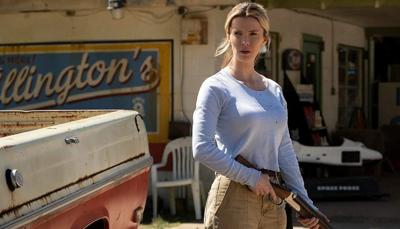“Most people know where they are.”
— Pop (Reed Birney)
Yes, The Hunt shares its basic construct — human beings hunting each other for sport — with 1932’s The Most Dangerous Game and later films such as The Hunger Games. But that’s where the similarity, for the most part, stops and The Hunt takes on its own identity.
The basic setup is a dozen people, portrayed by a few actors I’m familiar with and a few I’m not, are kidnapped and taken to a mysterious preserve where, similar to the characters in 2010’s Predators, it quickly becomes apparent that they are the prey in an elaborate hunt.
But here’s a wrinkle, however, that sets this new movie apart from other films of this type: The battle lines here are political, with evil libtard Democrats stalking deplorable alt-right Republicans, graphically dramatizing the current political schism in the United States.
The other fundamental way in which director Craig Zobel’s The Hunt differs is that it’s played mostly for comedy.
You could argue that American audiences are trained from toddlerhood to chortle or even outright guffaw at gruesome violence, raised as we are on Looney Tunes in which Elmer Fudd constantly tries to kill Bugs or Daffy, or the Coyote goes to fantastic lengths to slay his nemesis, the Roadrunner, but I’ll sidestep the debate on whether gouged eyeballs or pulped craniums or gory bisections are actually funny.
Nevertheless, it’s easy to understand why distributor Universal Pictures delayed last year’s original release date for The Hunt in the wake of real-life mass shootings.
I don’t necessarily want to consider the movie’s politics in assessing its value as a film, beyond the observation that it appears to err in the sense that right-wingers frequently dismiss left-wingers as anti-Second Amendment, gun-hating vegans too sissified to kill anybody just for the sport of it, yet here we see liberal “elites” who don’t necessarily fit the popular stereotype and who are ready to blood-let with gusto.
The thing that bothers me — and I’ll admit that it’s because of my own preconception about what I thought the film “should” be — is that it isn’t the suspenseful, breathless, “kill or be killed” thriller that I anticipated, but actually gets a little more complex. I mean, a little.
I also believe director Zobel and screenwriters Nick Cuse and Damon Lindelof screwed up with their narrative’s locale, the selection of which dilutes both their theme and its shock value. It’s also hard for the audience to figure out who the protagonist is — and not in a good way — early in the film.
But The Hunt‘s biggest positive is the deadpan delivery of that protagonist, Crystal, portrayed by Betty Gilpin, best known for her TV roles in series such as Nurse Jackie and GLOW. She knows how to milk every comedic moment, such as they are, and firmly takes charge of the film, even though it takes longer than it should for us to start identifying with her. Successfully moving her to the big screen may be The Hunt‘s most lasting accomplishment.
Whether you’re Republican red or Democrat blue, The Hunt is seldom more than moderately entertaining — despite Gilpin’s performance, and a lively final confrontation with villain Hilary Swank. Even being awash as it is in blood and gore, it flirts with real issues, but settles for making a big joke out of them.
Americans shooting each other for fun isn’t a joke, and it’s almost obscene to suggest that it is. For serious treatment of such themes try writer/director Kevin Smith’s little-seen 2011 effort Red State, a vastly superior film and probably Smith’s best work.









